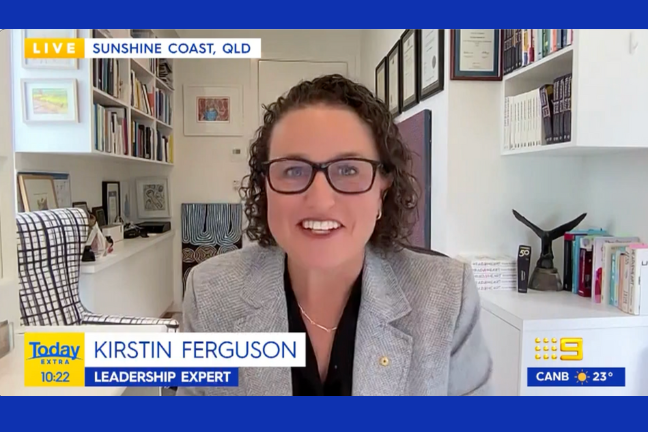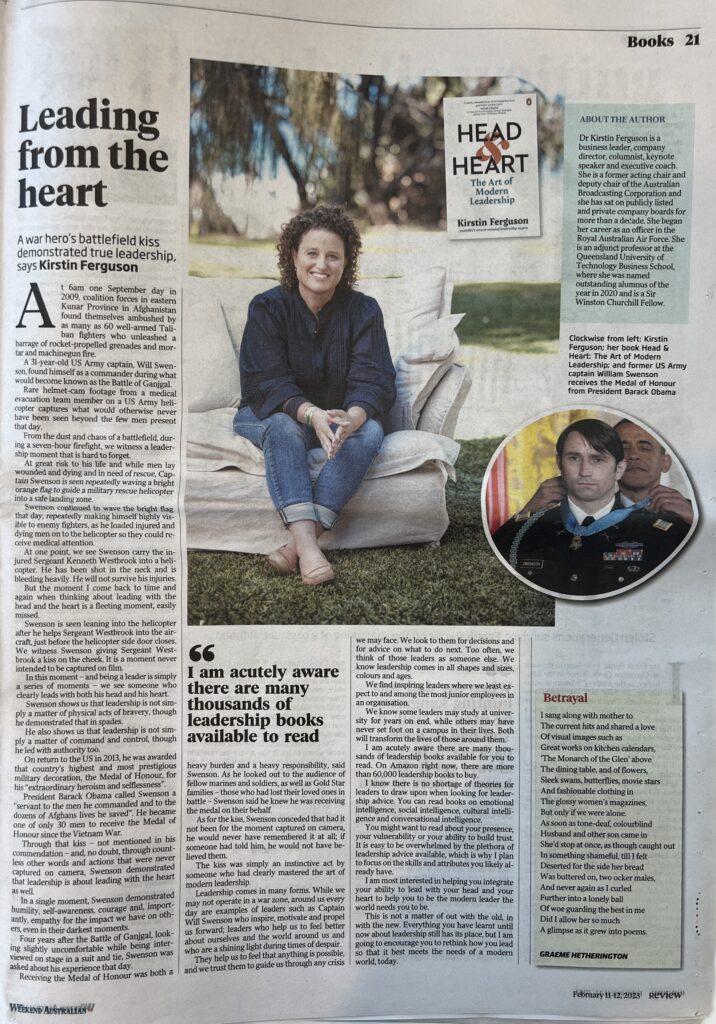
Complete the Head & Heart Leader Scale™ and receive a free, personalised report here.
Complete the Head & Heart Leader Scale™ and receive a free, personalised report here.
Kirstin Ferguson
February 10, 2023
At 6am one September day in 2009, coalition forces in eastern Kunar Province in Afghanistan found themselves ambushed by as many as 60 well-armed Taliban fighters who unleashed a barrage of rocket-propelled grenades and mortar and machinegun fire.
A 31-year-old US Army captain, Will Swenson, found himself as a commander during what would become known as the Battle of Ganjgal.
Rare helmet-cam footage from a medical evacuation team member on a US Army helicopter captures what would otherwise never have been seen beyond the few men present that day.
From the dust and chaos of a battlefield, during a seven-hour firefight, we witness a leadership moment that is hard to forget.
At great risk to his life and while men lay wounded and dying and in need of rescue, Captain Swenson is seen repeatedly waving a bright orange flag to guide a military rescue helicopter into a safe landing zone.
Swenson continued to wave the bright flag that day, repeatedly making himself highly visible to enemy fighters, as he loaded injured and dying men on to the helicopter so they could receive medical attention.
At one point, we see Swenson carry the injured Sergeant Kenneth Westbrook into a helicopter. He has been shot in the neck and is bleeding heavily. He will not survive his injuries.
But the moment I come back to time and again when thinking about leading with the head and the heart is a fleeting moment, easily missed.
Swenson is seen leaning into the helicopter after he helps Sergeant Westbrook into the aircraft, just before the helicopter side door closes. We witness Swenson giving Sergeant Westbrook a kiss on the cheek. It is a moment never intended to be captured on film.
In this moment – and being a leader is simply a series of moments – we see someone who clearly leads with both his head and his heart.
Swenson shows us that leadership is not simply a matter of physical acts of bravery, though he demonstrated that in spades.
He also shows us that leadership is not simply a matter of command and control, though he led with authority too.
On return to the US in 2013, he was awarded that country’s highest and most prestigious military decoration, the Medal of Honour, for his “extraordinary heroism and selflessness”.
President Barack Obama called Swenson a “servant to the men he commanded and to the dozens of Afghans lives he saved”. He became one of only 30 men to receive the Medal of Honour since the Vietnam War.
Through that kiss – not mentioned in his commendation – and, no doubt, through countless other words and actions that were never captured on camera, Swenson demonstrated that leadership is about leading with the heart as well.
In a single moment, Swenson demonstrated humility, self-awareness, courage and, importantly, empathy for the impact we have on others, even in their darkest moments.
Four years after the Battle of Ganjgal, looking slightly uncomfortable while being interviewed on stage in a suit and tie, Swenson was asked about his experience that day.
Receiving the Medal of Honour was both a heavy burden and a heavy responsibility, said Swenson. As he looked out to the audience of fellow marines and soldiers, as well as Gold Star families – those who had lost their loved ones in battle – Swenson said he knew he was receiving the medal on their behalf.
As for the kiss, Swenson conceded that had it not been for the moment captured on camera, he would never have remembered it at all; if someone had told him, he would not have believed them.
The kiss was simply an instinctive act by someone who had clearly mastered the art of modern leadership.
Leadership comes in many forms. While we may not operate in a war zone, around us every day are examples of leaders such as Captain Will Swenson who inspire, motivate and propel us forward; leaders who help us to feel better about ourselves and the world around us and who are a shining light during times of despair.
They help us to feel that anything is possible, and we trust them to guide us through any crisis we may face. We look to them for decisions and for advice on what to do next. Too often, we think of those leaders as someone else. We know leadership comes in all shapes and sizes, colours and ages.
We find inspiring leaders where we least expect to and among the most junior employees in an organisation.
We know some leaders may study at university for years on end, while others may have never set foot on a campus in their lives. Both will transform the lives of those around them.
I am acutely aware there are many thousands of leadership books available for you to read. On Amazon right now, there are more than 60,000 leadership books to buy.
I know there is no shortage of theories for leaders to draw upon when looking for leadership advice. You can read books on emotional intelligence, social intelligence, cultural intelligence and conversational intelligence.
You might want to read about your presence, your vulnerability or your ability to build trust. It is easy to be overwhelmed by the plethora of leadership advice available, which is why I plan to focus on the skills and attributes you likely already have.
I am most interested in helping you integrate your ability to lead with your head and your heart to help you to be the modern leader the world needs you to be.
This is not a matter of out with the old, in with the new. Everything you have learnt until now about leadership still has its place, but I am going to encourage you to rethink how you lead so that it best meets the needs of a modern world, today.
ABOUT THE AUTHOR
Dr Kirstin Ferguson is a business leader, company director, columnist, keynote speaker and executive coach. She is a former acting chair and deputy chair of the Australian Broadcasting Corporation and she has sat on publicly listed and private company boards for more than a decade. She began her career as an officer in the Royal Australian Air Force. She is an adjunct professor at the Queensland University of Technology Business School, where she was named outstanding alumnus of the year in 2020 and is a Sir Winston Churchill Fellow.





